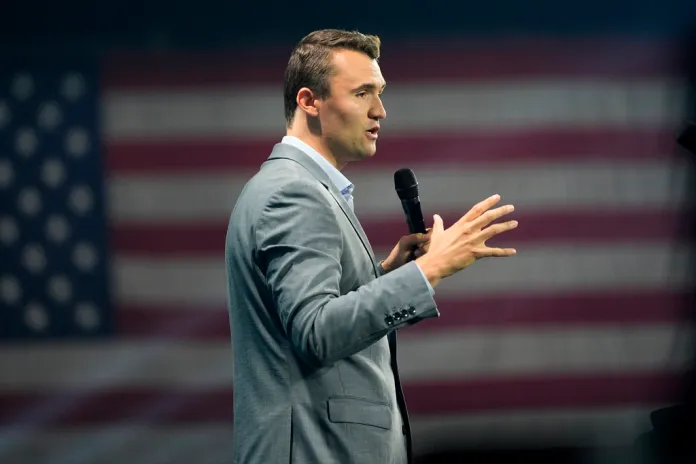Following the assassination of conservative activist Charlie Kirk on Wednesday, President Donald Trump addressed the nation by expressing his grief, anger, and intention to quash the rhetoric “directly responsible for the terrorism that we’re seeing in our country today.”
While the president didn’t give many details regarding his plan to address the precursors to political violence, he did provide at least one hint.
“For years, those on the radical Left have compared wonderful Americans like Charlie to Nazis and the world’s worst mass murderers and criminals,” Trump said. “This kind of rhetoric is directly responsible for the terrorism that we’re seeing in our country today, and it must stop right now. My administration will find each and every one of those who contributed to this atrocity, and to other political violence, including the organizations that fund it and support it, as well as those who go after our judges, law enforcement officials, and everyone else who brings order to our country.”
GOP lawmakers could support such efforts on Capitol Hill. Rep. Chip Roy (R-TX) said Friday that Congress should “follow the money” to uncover the sources of “coordinated anti-American assaults.” The House Ways and Means Committee, meanwhile, had already begun to investigate nonprofit groups with ties to the radical Left.
ROY ASKS TO FORM COMMITTEE FOR INVESTIGATING ‘RADICAL LEFT’ GROUPS PUSHING POLITICAL VIOLENCE
Some on the Left, reacting to the president’s statement, have speculated that Trump may be ramping up to crack down on liberal activist groups.
“Trump is signaling that he’s going to use Charlie Kirk’s death to launch a war against left and liberal organizing,” left-wing streamer Hasan Piker wrote of the address.
Right-of-center experts, however, gave more measured assessments of what the president may have meant.
“The law provides many, many justifications for the Department of Justice, the FBI to investigate radical groups,” Manhattan Institute legal policy fellow Tal Fortgang told the Washington Examiner. “It could be for connections to terror organizations. It could be for organized crime domestically. Any of these are plausible justifications. Unless you can tie whoever is responsible for this to a criminal enterprise, it’s going to be hard to just bring charges against radical groups or start filing lawsuits against radical groups.”
Sarah Lee, the director of communications for the Capital Research Center, echoed Fortgang’s point that legal designations would likely need to be made before more decisive action can be taken.
“It’s clear, ideology aside, since we don’t have clear confirmation of that in the Kirk murder case yet, the nation is suffering from aggressive domestic terror attacks,” Lee told the Washington Examiner in an interview before authorities announced they had apprehended a suspect on Friday. “We do already know a little about the groups that have supported those efforts over the last several years. And we have some idea about the funding behind many of them. But, as with foreign terror groups, those domestic groups would need to be legally defined as domestic terror groups first before we can look at tackling the funding for materially supporting their illegal activities.”

Lee and Fortang were both hesitant to name specific groups they believe the president may target. However, Tyler O’Neil, who has written two books about left-wing groups and extensively covered left-wing nonprofit organizations, was willing to speculate.
“The administration may investigate the Southern Poverty Law Center, which put Turning Point USA on its ‘hate map’ earlier this year, before the Charlie Kirk assassination,” O’Neil said in a statement to the Washington Examiner. “The SPLC has put many law-abiding, mainstream conservative and Christian groups on that map in an effort to excise them from polite society. The SPLC does not advocate violence against these people, but now at least two organizations on the map have been targeted in violent shootings.”
In addition to Kirk’s assassination, O’Neil was referring to the 2013 shooting at the Family Research Council’s D.C. headquarters when Floyd Lee Corkins walked into the organization’s lobby armed with a 9 millimeter pistol and 50 rounds of ammunition, shooting an unarmed security guard before being wrestled to the ground. Corkins told authorities after the shooting that he chose to attack the FRC after finding it on the SPLC’s list of “hate groups.”
Conservative critics have said that the SPLC seeks to associate mainstream conservative groups, such as the Alliance Defending Freedom or Moms For Liberty, with infamous organizations such as the Ku Klux Klan and Neo-Nazi cells by placing them on the same list of “hate groups.”
Tides, WESPAC Foundation, and Indivisible, three groups that provide large amounts of funding and administrative services for protest groups across the country, could also face scrutiny from the Trump administration. Some of the protests supported by these organizations have turned violent or resulted in property damage.
“President Trump may target the Left’s dark money network, which has indirectly funded groups that organize protests on college campuses and elsewhere,” O’Neil continued. “Such cases will be extremely hard to prove, however, because the donor networks do not promote or advocate violence and they distance themselves from activists on the ground.”
